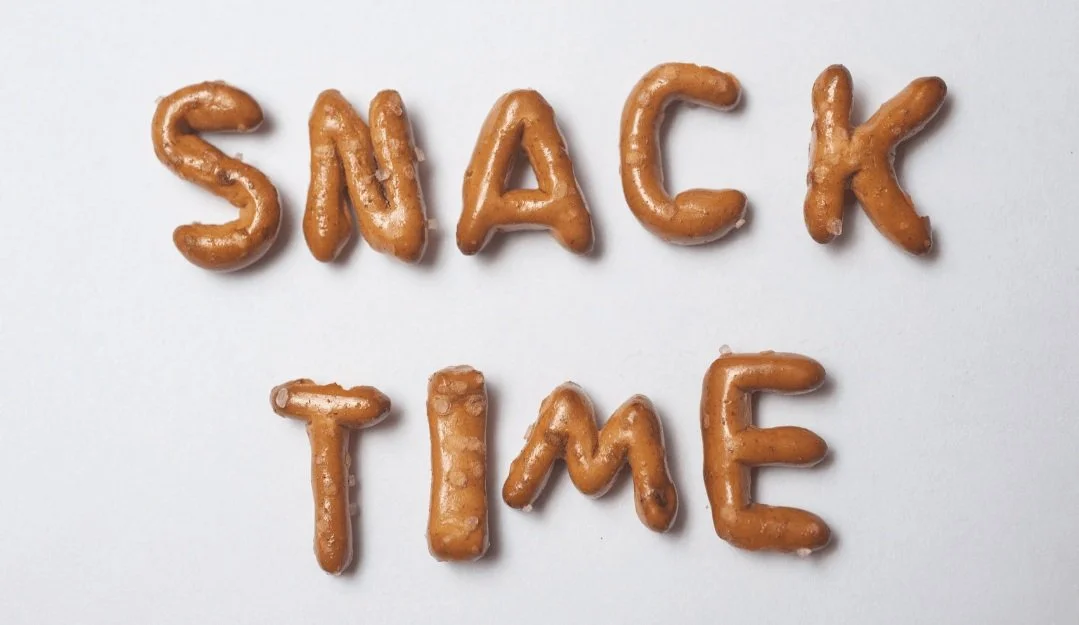Snack Time! The Many Benefits of Snacking
Written by Briana Mancha RDN
Snacking has long been a topic of debate, often subjected to scrutiny and misconceptions that it contributes to weight gain, fosters poor eating habits, and disrupts the enjoyment of meals. In today's diet-centric culture, where messages to "eat less" and strive for a smaller physique are ubiquitous, the mere mention of snacking can evoke a myriad of emotions – from guilt and judgment to excitement. Yet, amidst these prevalent attitudes, it's crucial to recognize that snacking can be a healthy and integral part of our lives.
At As You Are Nutrition, we like to reframe the narrative around snacking, viewing it as a positive aspect of the healing journey. In this blog post, we aim to explore the multifaceted benefits of snacking, emphasizing its role in providing energy, stabilizing blood glucose levels, honoring hunger cues, and introducing variety into our diets.
Provide Energy:
Snacking strategically between meals serves to maintain steady energy levels throughout the day. It provides the essential fuel our bodies need to function optimally, supporting not only physical activities but also cognitive processes. While many individuals follow a pattern of eating every 3-4 hours to sustain energy levels, it's crucial to recognize that there's no one-size-fits-all meal plan. What works for one person may not work for another, and it's important to honor individual variations in food and energy needs. Furthermore, snacking can be particularly beneficial for folks with poor appetites or those facing challenges in consuming full meals due to illness.
Consider a scenario where someone experiences a mid-morning energy dip. Without a snack to replenish their energy, they may struggle to focus on tasks and experience a decrease in productivity. However, by incorporating a snack, such as an apple and peanut butter, they can effectively refuel their body and maintain optimal energy levels until the next meal. So instead of reaching for another cup of coffee, try a yummy snack instead.
When discussing snacks that provide sustained energy, it's important to highlight the role of different macronutrients in fueling our bodies effectively. Let’s run through a quick overview because we need all of them to make a balanced snack!
Carbohydrates are the body's preferred source of energy, making them a great foundation for a snack. They are efficiently converted into glucose, which fuels our cells, tissues, and organs, providing the energy needed for everyday activities and bodily functions. When we consume carbohydrates, they are broken down into glucose and absorbed into the bloodstream, where they can be readily used for energy. Plus, fiber is a type of carbohydrate that is important for our microbiobome! Why not use snack time to feed our gut bacteria too?
Protein is essential for building and repairing tissues, including muscles, bones, skin, and hair. It also plays a vital role in the production of enzymes, hormones, and other important molecules in the body. Including protein in snacks helps promote muscle recovery, growth, and supports satiety.
Fat is a concentrated source of energy and serves as a crucial component of cell membranes, nerve tissue, and hormone production. Dietary fats are also important for absorbing fat-soluble vitamins (A, D, E, and K), supporting brain health, and providing insulation and protection for vital organs. Incorporating fats into snacks helps with satiety, and supports brain function and cognition.
Stabilize Blood Glucose:
Consuming satisfying snacks helps prevent drastic fluctuations in blood sugar levels, thereby promoting stability and sustained energy. Prolonged periods without eating, especially between meals, can lead to significant drops in blood glucose levels. Blood sugar fluctuations play a crucial role in regulating various physiological processes within the body, and their impact extends far beyond just energy levels. When blood sugar levels rise or fall too sharply, it can lead to a cascade of effects that influence not only our physical well-being, but also our mood and cognitive function. The brain relies heavily on glucose as its primary source of energy. Incorporating snacks containing a balance of carbohydrates, proteins, and fats can help us regulate our blood sugar levels, and foster overall well-being. This is true for most folks, even without diabetes.
Honor Hunger:
When satisfying the body's hunger cues with snacks, people are less likely to experience the ravenous feeling that can lead to overeating and discomfort (physically and emotionally!). Listening to interoceptive cues of hunger and fullness is also helpful when planning snacks. If you consistently feel hungry between meals, it may be helpful to consider increasing the size or frequency of snacks. On the other hand, if you are rarely hungry for snacks, you may opt for rearranging the frequency or choosing different snack options. Incorporating snacks into your daily routine can help cultivate a healthier relationship with food, respect your body's needs, and avoid the urge to overcompensate for prolonged periods of hunger during meals.
Imagine a situation where someone follows a rigid eating schedule, ignoring their body's signals of hunger between meals. As a result, they may experience intense hunger pangs by the time their next meal rolls around, leading to overeating and feelings of discomfort and possible guilt. By listening to their body's cues and incorporating nutritious snacks when hunger strikes, they can prevent excessive hunger and maintain a more balanced approach to eating.
Understanding hunger is important to developing a trusting relationship with our bodies. There are four distinct types of hunger, each playing a role in influencing when and what we choose to eat.
Biological hunger: Biological hunger, also known as physical hunger, refers to the physiological processes involving the brain-gut connection. This system uses appetite-regulating hormones to signal when it's time to eat and nourish the body.
Emotional hunger: Emotional hunger arises when there's an unmet emotional need, whether positive or negative, such as sadness, stress, boredom, or happiness. Although emotional hunger is often viewed negatively, it's a common and normal experience! It's important to acknowledge that while food can offer temporary comfort, it doesn't resolve the underlying emotional need. Emotional hunger can be challenging to distinguish from biological hunger. Consulting with a dietitian may help you better understand your unique hunger cues and emotional needs.
Taste hunger: Taste hunger occurs when there is a craving for something specific or one eats simply because they’re in the mood to. For example, eating dessert after a satisfying dinner or sampling a friend's specialty dish at a gathering. You are allowed to honor taste hunger even when biological hunger isn’t present!
Practical hunger: Practical hunger is about planning ahead. Just as you would plan to use the restroom before a long road trip, you may plan to eat a meal or snack before an event where there won’t be an opportunity to eat for a few hours, even if biological hunger isn’t present. This prevents extreme hunger and avoids the risk of overeating later.
Add Variety:
Snacking offers an opportunity to diversify our dietary intake by incorporating a wide range of foods, flavors, and textures. After all, variety is not only the “spice of life” but also a cornerstone for our gut heath . Think of ways you can ADD to the snacks you already enjoy. Experimenting with different snack options not only keeps our taste buds engaged but also ensures we receive essential nutrients, contributing to overall health and well-being!
You may be wondering, "what does a satisfying snack look like?" Be sure to explore our blog post on "How to Build a Satisfying Snack" for practical tips and creative ideas to make snacking a nourishing and enjoyable part of your day. This blog post provides a range of snack options from on-the-go fuel to snacks you can make when there is more prep time.
In essence, the benefits of snacking, including its role in providing energy, stabilizing blood glucose levels, honoring hunger cues, and adding variety to our diets can help reshape our relationship with food. At As You Are Nutrition, we advocate for embracing snacking as a positive aspect of the healing journey, offering practical guidance on how to build satisfying snacks that nourish both the body and the soul. By listening to our bodies, honoring hunger, and incorporating diverse snack options into our daily routine, we can cultivate a healthier approach to eating and experience the joy of nourishing ourselves fully.
Working with a dietitian can provide personalized snack suggestions tailored to individual preferences and health conditions. Let's relinquish the guilt and judgment surrounding snacking and instead savor the opportunity to fuel our bodies and nourish our lives, one snack at a time.




